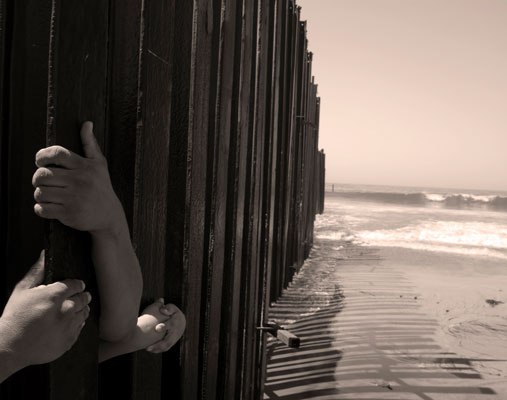The views expressed in our content reflect individual perspectives and do not represent the authoritative views of the Baha'i Faith.
Recently I watched, on Al Jazeera America news, an interview with a young Honduran boy who crossed the border between Mexico and the United States. Under pressure and fearing death from gangs he refused to join in his home town, and separated from his parents who had come to the U.S. for work, he leapt into the migratory river of young, often unaccompanied children and teenagers now fleeing to El Norte as refugees from failed states.
“If your parents are already in Los Estados Unidos,” he said, “the government will let you stay.” This idea, partly rumor and partly fact, is actually true for minors of non-contiguous nationalities—in other words, if you’re not from Mexico or Canada, and you’re under 18, and at least one parent resides in the U.S., and you make it across the entire dangerous length of Mexico and then across a heavily-patrolled border—well, then U.S. law, like the law in most developed nations, says you must be reunited with your resident parent.
Which makes sense–only a truly heartless country would turn refugee children like this boy away.
So when he crossed the Rio Grande River he immediately looked for the Border Patrol, hoping La Migra would pick up and detain him. Sure enough, they quickly found him and took him to a hot, overcrowded detention center, a full-lockdown jail where he spent three miserable weeks. The story concluded as he tearfully reunited with his parents, when the detention center released him into their waiting arms.
 This boy took a harrowing, uncertain, treacherous journey of more than a thousand miles by himself, knowing that he faced the risk of abuse and injury and death on the way north, but also knowing that he would most likely lose his life if he remained in his violent village in Honduras. At the end of his journey he looked terribly traumatized, but also enormously relieved. Who knows what he had to endure.
This boy took a harrowing, uncertain, treacherous journey of more than a thousand miles by himself, knowing that he faced the risk of abuse and injury and death on the way north, but also knowing that he would most likely lose his life if he remained in his violent village in Honduras. At the end of his journey he looked terribly traumatized, but also enormously relieved. Who knows what he had to endure.
Regardless of how you feel about immigration, whether legal or illegal, his story has a powerful emotional impact—and there are thousands upon thousands of stories just like his. America’s southern border has recently experienced a sudden surge of child and adolescent immigrants—more than 50,000 children in the first five months of 2014—in the same way that European and Australian and many other borders around the world have seen large numbers of migrants attempting to flee to the security, the stability, the jobs, the educational opportunities and the basic human safety they offer.
In today’s world, migration has become a major factor in the slow disintegration of the concept of national borders. This series of essays will address the global “immigration problem” with a completely new approach, one you may never have considered—the Baha’i principle of one indivisible world:
That one indeed is a man who, today, dedicateth himself to the service of the entire human race. The Great Being saith: Blessed and happy is he that ariseth to promote the best interests of the peoples and kindreds of the earth. In another passage He hath proclaimed: It is not for him to pride himself who loveth his own country, but rather for him who loveth the whole world. The earth is but one country, and mankind its citizens. – Baha’u’llah, Tablets of Baha’u’llah, p. 167.
This revolutionary concept of transnational, global citizenship represents the core social principle of the Baha’i Faith. It has implications for the entire political structure of the world’s governments and societies. It challenges old, outworn notions about nationality, patriotism and love of country. It calls for the remaking of the prevailing order, and it asks every human being to reconsider their “national” identity, subordinating their love of country and replacing it with a wider and more inclusive love and loyalty for all humanity and for the planet itself.
Once adopted and put into practice, world unity and global citizenship will end the terrible injustices of birth and the tyranny of national borders; will not only allow but encourage the free movement of all people across the earth; will help halt the humanitarian crises and disasters now foisted upon us by corrupt, competing and combative countries; will offer humanity its first true opportunity to effectively address the earth’s pressing environmental issues; will increasingly bring the populations of all regions into peaceful contact with each other; and most importantly, will make it impossible for any one nation to impose its will on others by making war.
World unity and global citizenship will also make the lives of refugees who need to cross borders simpler and safer.
Let’s take a look, in this series of essays, at the possibilities and the potential problems of world government, at the movements that advocate for it and against it, at the current global governance models already existing and functioning, and at the strong rationales the Baha’i teachings offer for its rapid adoption.
















Comments
Sign in or create an account
Continue with Googleor